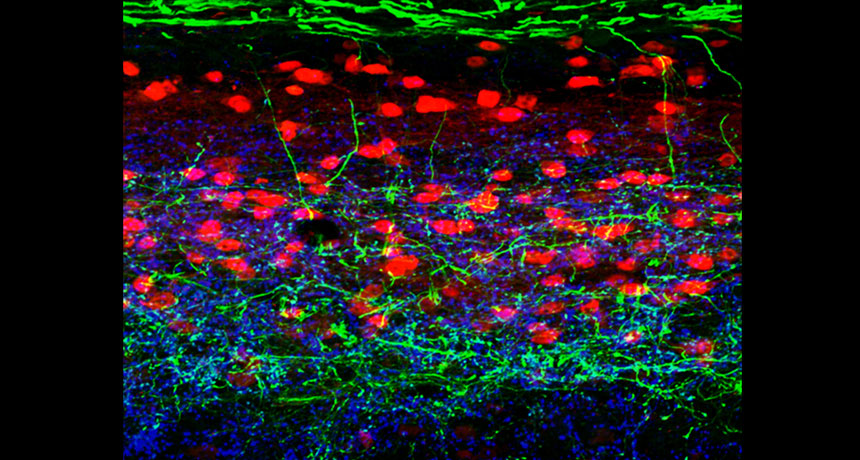Scientists discover itch-busting cells
The finding in mice could lead to treatment for chronic itching

Specialized nerve cells in the spinal cord of mice (seen here, in red) block the itching sensation caused by something lightly touching or scratching the skin.
Salk Institute
A fly tickling the hair on your arm can spark a maddening itch. Now, scientists have spotted nerve cells in mice that curb this light twiddling sensation. If humans have similar itch-busters, the results could lead to treatments for the millions of people who suffer from chronic, unstoppable itch.
For many of these people, there are currently no good treatments. “This is a major problem,” says Gil Yosipovitch. He directs the Temple University Itch Center in Philadelphia, Pa., and was not involved in the new study.
All touch sensations — including itch — start at the skin. In recent years, scientists have started to learn how nerve cells carry itchy signals from there to the spinal cord and on up to the brain. Often the original itch signal is triggered by chemicals, such as those that mosquitoes inject. For another sort of itch, all that’s needed is a light touch on the skin. That’s called a mechanical itch. The fact that this type of itch exists is no surprise, Yosipovitch says. Mechanical itch may help explain why clothes or even dry, scaly skin can be so itchy. It’s also why you might feel a mosquito crawling on your skin before it takes a bite.
The new study, published October 30 in Science, involved mice with one key defect. Scientists had altered their genes so that they lacked a certain type of nerve cell in their spinal cords. Without those cells, the mice “have the urge to scratch all the time,” says study coauthor Qiufu Ma. He’s a neuroscientist at Harvard Medical School in Cambridge, Mass. Even with nothing specifically causing them to itch, the mice scratched so often that they developed bald patches on their skin. A light touch from a thin wire will cause a mechanical itch. This touch led the mice to scratch themselves more than regular mice did. Yet the itchy mice responded to pain and itch-causing chemicals normally.
That suggests some nerve cells detect only mechanical itch, Ma concludes. If a light touch taps into the itch accelerator, then these spinal-cord nerve cells act as the brakes, says Martyn Goulding, who also worked on the study. He’s a neuroscientist at the Salk Institute for Biological Studies in La Jolla, Calif. Removing these nerve cells lets the itch signal more easily get through to the brain, he says.
The discovery of itch-blocking nerve cells opens up new possibilities for understanding itch, Goulding says. Now, scientists can start to piece together the rest of the nerve pathway that detects mechanical itch on the skin and then carries that signal to the brain. These nerve cells produce a chemical signal called neuropeptide Y. Future experiments can test what role that chemical plays in how a mechanical itch makes itself known, he says.
It makes sense that human skin would develop the ability to detect an itchy tickle, Goulding says. An insect crawling on your skin could be harmless. But if it’s carrying germs and bites you, it might cause a nasty infection, he says. A quick scratch, prompted by an itch, might prevent that.
Power Words
(for more about Power Words, click here)
chemical A substance formed from two or more atoms that unite (become bonded together) in a fixed proportion and structure. For example, water is a chemical made of two hydrogen atoms bonded to one oxygen atom. Its chemical symbol is H2O.
chronic A condition, such as an illness (or its symptoms, including pain), that lasts for a long time.
gene (adj. genetic) A segment of DNA that codes, or holds instructions, for producing a protein. Offspring inherit genes from their parents. Genes influence how an organism looks and behaves.
germ Any one-celled microorganism, such as a bacterium, fungal species or virus particle. Some germs cause disease. Others can promote the health of higher-order organisms, including birds and mammals. The health effects of most germs, however, remain unknown.
itch A sensation on the skin that causes a person or animal to want to scratch. Itch sensations can be short-lived, such as when they are caused by a mosquito bite, or they can be chronic, even lasting for years without relief.
mechanical Having to do with the devices that move, including tools, engines and other machines (even, potentially, living machines); or something caused by the physical movement of another thing (such as a “mechanical” itch).
neuron or nerve cell Any of the impulse-conducting cells that make up the brain, spinal column and nervous system. These specialized cells transmit information to other neurons in the form of electrical signals.
neuroscience Science that deals with the structure or function of the brain and other parts of the nervous system. Researchers in this field are known as neuroscientists.
spinal cord A cylindrical bundle of nerve fibers and associated tissue. It is enclosed in the spine and connects nearly all parts of the body to the brain, with which it forms the central nervous system.







